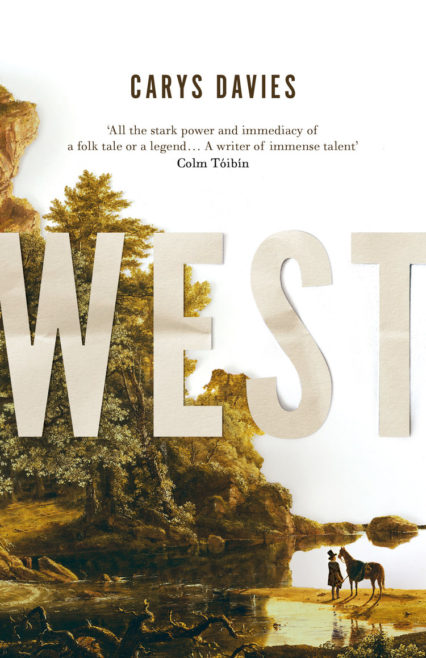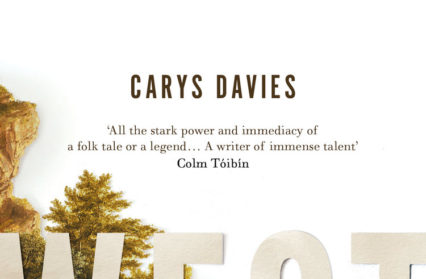Carolyn Percy reviews the debut novel, West, from Carys Davies, whose collection of short stories won the Frank O’Connor International Prize.

Cy Bellman and his wife come to America for the promise of a different life, a better one. But then she dies, leaving Cy and their young daughter Bess alone. One day, he sees a story in the newspaper about the huge bones of some ancient animal discovered in the mud of a Kentucky swamp and it quickly becomes all he can think about. He must find out if the rumours are true, and, maybe, if there are any that still live. And so, he sets out from his Pennsylvania mule farm for the unmapped wilderness beyond the Mississippi River. But in doing so, leaves Bess behind, vulnerable to the beasts that roam closer to home while she awaits her father’s return.
West starts out as an American frontier fable: like the pure, kind-hearted fool in a fairy tale, Bellman embarks on a seemingly mad quest that elicits scorn and mockery from those around him, leaving Bess – the ‘maiden’ on the verge of puberty – vulnerable to unwanted and inappropriate male attention, particularly from Elmer Jackson, their neighbour and farmhand. Like the wolves who prey upon the heroine in fairy tales, Elmer’s designs on Bess are often compared to the activities of the mules, showing sexual predation in a distinctly animalistic light.
But what starts out as a fable slowly and organically turns into a kind of Greek tragedy. Shortly into his journey, Bellman acquires a guide of sorts: a seventeen-year-old Native American boy inauspiciously named ‘Old Woman From A Distance.’ He and Bess become the story’s chorus, its observers. Considering the story’s location and the period in which it’s set, no mention of the Native Americans would have been a little disingenuous, but Carys Davies weaves their story into the narrative with sensitivity and relevance. The relationship between Bellman & Old Woman is a lot more complicated than mere adventurer and companion: for one, they haven’t come together voluntarily as Bellman literally ‘acquires’ him from a French Fur Trader; and second, neither speaks the other’s language, so they cannot communicate effectively. It’s also a relationship characterised by a lot of mutual suspicions: Bellman harbours at least the minimum amount of white settler suspicions and prejudices towards the natives, and it is heavily implied that Old Woman’s sister was raped and killed by white settlers or soldiers, specifically by one who shares Bellman’s distinctive red hair. (Old Woman also often thinks about a prophecy voiced by one of the elders of his tribe: that entering any kind of commerce with the white settlers will spell the beginning of the end of their world, which, given the fact that they weren’t given what they were promised by the US government and were instead increasingly marginalised, turned out to be true.) But, at the same time, it’s also characterised by moments of mutual kindness and co-operation.
Events reach a tragic head as Bellman battles with the elements, dwindling resources, illness, overwhelming homesickness and the fear that the whole journey has been a huge mistake. Old Woman averts further tragedy – whether consciously motivated to do so or not will be an interesting point of discussion – and everything ends on a bittersweet note, with its arresting final image, of Bess, turning Old Woman, in her imagination, into a kind of patchwork knight: “…he would be carrying the umbrella under his arm, like a lance. The potholder he would have tied, perhaps, onto his head, the dishcloth and apron around his shoulders. When she closed her eyes she saw them fluttering behind him in the morning breeze like a flag, and a jewelled cape.”
West is a beautifully written fable on the conflict between the quixotic and the mundane, and though it’s Bellman’s romantic tendencies that are ultimately his downfall, the story is not a condemnation but, rather, a paean; acknowledging that the unknown is as vital for the human soul as sustenance is for the body, providing a balance can be struck. As they say in La La Land, “here’s to the fools who dream.”
West by Carys Davies is available now from Granta.
Carolyn Percy is an avid contributor to Wales Arts Review.












